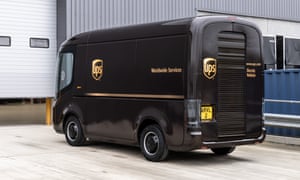US delivery company order the latest sign of the rapid growth of the manufacturer

The first versions of Arrival’s van have been made at a factory in Banbury.
Photograph: Arrival
Electric van maker Arrival has secured a €400m (£339m) order for 10,000 vehicles from United Parcel Service (UPS), the US delivery company, in the latest sign of the rapid growth of the UK-based manufacturer.
The purpose-built electric vans will be rolled out in the UK, Europe and North America starting this year and continuing until 2024, with UPS retaining the option to purchase another 10,000.
In practice the total value of vehicles bought by UPS could increase to as much as €600m, a source said, depending on how many larger or longer-range vans it required.
UPS will also take an equity stake of an undisclosed size in Arrival, after working with the company on early trials. The stake is not thought to be on the same scale as the €100m investment made by South Korean companies Hyundai and Kia earlier this month, which gave Arrival “unicorn” status, with a valuation of £3bn.
Arrival’s growth has taken the British automotive industry by surprise, at a time when investment in the UK sector has stalled in the face of Brexit uncertainty. At the same time, traditional carmakers have been hit by the decline of diesel and the steep costs of investing in electric vehicles with zero carbon dioxide exhaust emissions.
However, Arrival, which was founded by Russian entrepreneur Denis Sverdlov in 2015, says that it can develop its electric vehicle platform for £100m, a fraction of the cost of incumbents. Arrival also rejects the standard production line in favour of using robots to make its van on a single spot, and uses a modular design which it says allows for easy customisation of vehicles. It is focused on urban delivery, with lower range requirements.
The first vans have been built at the company’s first “microfactory” in Banbury, Oxfordshire, but others will be made close to their end markets, likely near major markets such as New York and Los Angeles.
The UPS deal implies that the base price of an Arrival van will be about £34,000, compared to a £27,900 sticker price for a new Ford Transit with an internal combustion engine – although with lower maintenance and fuel costs the total cost of ownership for electric vans could be lower. That price would also put it in line with or below the expected cost of a Mercedes eSprinter or Volkswagen’s e-Crafter electric vans, both of which are due this year.
The order represents a significant expansion of UPS’s electric capabilities, as the threat of internal combustion engine limits from cities such as Bristol puts the focus on zero-emission vehicles for “last mile” deliveries.
UPS wants to help solve the “chicken and egg” problem of a meagre supply of electric vans on the market, according to Luke Wake, UPS’s international director of automotive engineering.
“There is demand there,” said Wake. “We want a supply that can help fulfil that. Our goal is to use electric vehicles in a way that can be scaled.”
Wake highlighted the Arrival vans’ driver assistance capabilities, as well as features like automatic door opening for drivers carrying large packages and cameras replacing wing mirrors to eliminate blind spots.